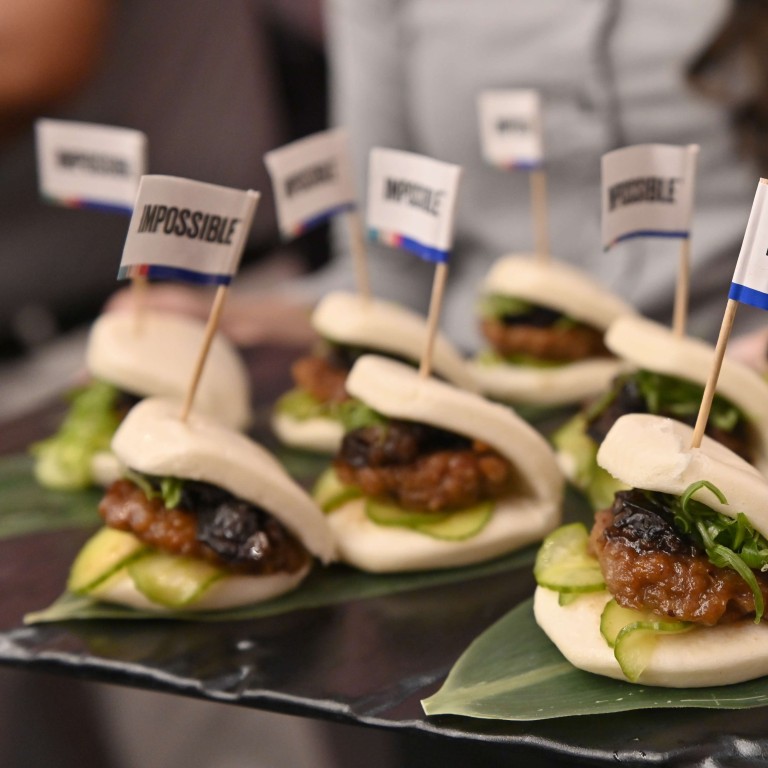
Impossible Pork: in Muslim Southeast Asia, an impossible sell?
- The company behind the Impossible Burger is hoping to gain halal certification for its new products Impossible Pork and Impossible Sausage
- But in a region where four in 10 people are Muslim, even the name may be unpalatable
When Impossible Burgers launched in Singapore 10 months ago, they were a hit with many curious foodies who were surprised by how much like beef the plant-based products tasted.
But whether Impossible Foods, the company behind the burgers, will be on to another winner with its Impossible Pork and Impossible Sausage is another matter entirely.
Encouraging Muslims to take a bite out of either of these products seems like something of a Mission Impossible in Southeast Asia, where experts say even the names could prove off-putting. More than four in 10 of the region’s population of 665 million practise Islam, in which consuming pork is haram or forbidden.
Pat Brown, the CEO of the company, which debuted the two new products in the United States this week, has said the products were not specifically designed to target people with religious objections, but that seeking kosher and halal certification was “important to us”. The two products are made entirely from plants and contain no animal hormones.

Impossible Foods estimates that about 2.5 billion people worldwide refrain from pork and pork-derived products based on the religious practices of Hindus, Jews, Muslims and some Christian sects.
The company’s senior flavour scientist Laura Kliman said everyone could enjoy Impossible Pork “without compromise to deliciousness, ethics or Earth”.
It’s as yet unclear whether the region’s Islamic authorities will clear the products as suitable for Muslim consumption. While the Impossible Burger received its kosher certification from the Union of Orthodox Jewish Congregations of America in May 2018, and its halal certification from the Islamic Food and Nutrition Council of America in December of the same year, neither of the new offerings have been certified in the US.
Islam-friendly coconuts: has Malaysia’s halal drive gone too far?
The Islamic Religious Council of Singapore said it was aware of the new products and was “convening experts to determine its suitability for Muslim consumption”.
Azmi Abdul Samad, chief executive of HalalHub Consultants, who helps restaurants and food producers get halal certification in Singapore, said the name was off-putting for Muslim consumers and would probably make it hard for the manufacturer to get halal certification in Southeast Asia.
“You can call it Impossible whatever meat, but not a name associated with pigs and pork,” he said. “There is a certain requirement with regards to naming. Jakim [Malaysia’s Department of Islamic Development] wouldn’t even let you use the word ham even if it’s chicken ham, and Malaysia doesn’t allow the word ham in halal restaurant,” he said.

He said Singapore allows the word ham or bacon in halal food, but it must have a prefix stating it is made from other animals, such as chicken ham or turkey bacon. Impossible Pork would not make the cut because “pork” suggests that it is made from pigs, he said.
Many consumers told This Week in Asia they would be unlikely to touch the products regardless of certification.
Singaporean Nurlin Mohamed said she would shun them in the same way she stayed away from non-alcoholic beer.
“Muslims are forbidden to consume alcoholic drinks and pork. So to me, anything that resembles these two items is best avoided. It is the same with some Hindus who are vegetarian – they do not eat mock meat,” said the events manager, 45.
Non-alcoholic beer has had mixed fortunes in the region. Indonesia, a largely Muslim nation, has had a homegrown brand since 2004 called Bintang Zero. But in Malaysia, Heineken had to clarify that its product was non-halal and only targeted at non-Muslims. The country’s Islamic body had said Muslims were prohibited from drinking soft drinks made from the same process as that of alcoholic drinks.
Going global: could halal be the next kosher?
Still, when it came to pork, housewife Rosminah Nor, 50, said there was a mental barrier she could not get over.
“I definitely won’t eat it! It might not be actual pork, but it’s still being branded as ‘pork’ and supposed to taste like it, right?”
But not all Muslims are against the thought. Indonesian account executive Khansa Nadhira, 24, was interested. “As a Muslim, I am sometimes curious about how pork tastes and this means I can finally try it. But maybe my friends and family who are more religious wouldn’t really dare to try.”

